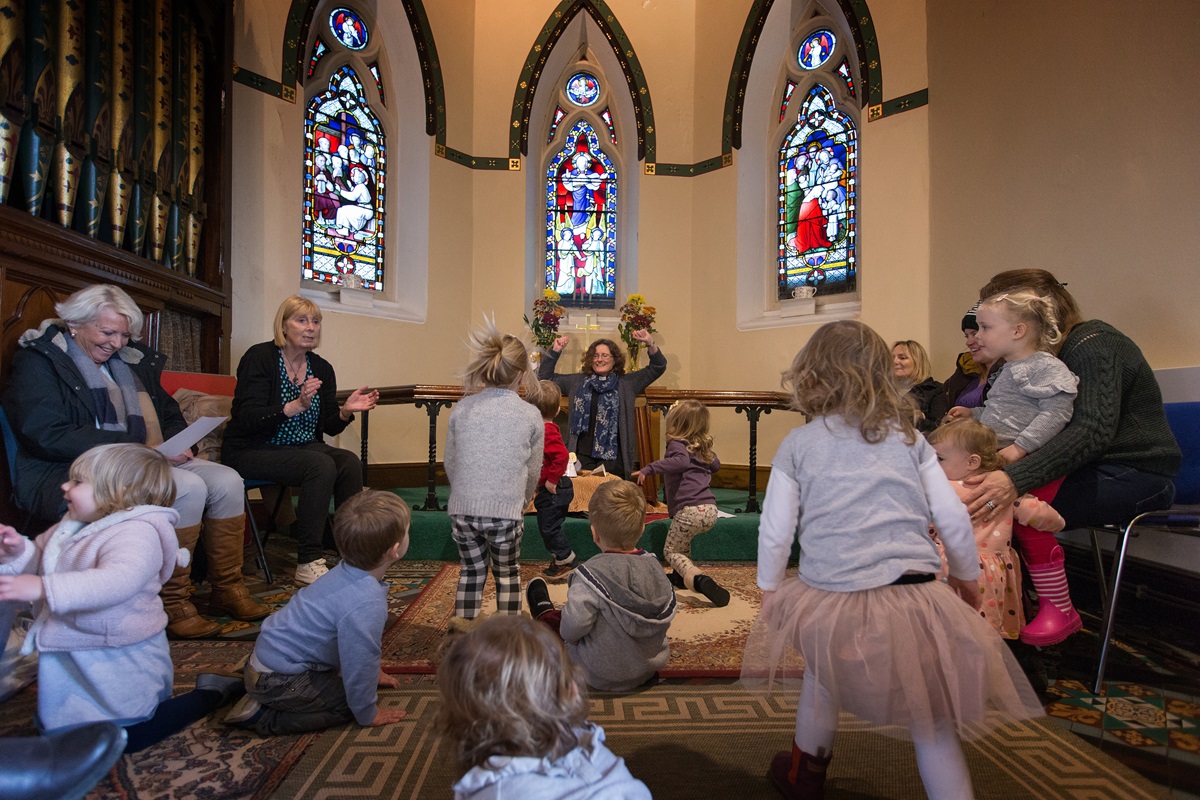Editor’s note: This is the third of an occasional series of stories, “British Methodism: Staying relevant in Wesley’s homeland,” about today’s Methodist Church in Britain.
The Rev. Katy Thomas had no hesitation about sitting on the floor in front of the altar at St. Mary’s Methodist Church on a cold Friday morning.
After all, it was the “Tiny Hands” Christmas program and she needed to get on their level to share her picture book and props if she was going to keep them interested.
The preschoolers hopped up and down during the “Tiddly Nativity.” A few pretended to sleep like Joseph and they gathered to see Mary’s tiny baby from the manger set. Some walked around in a circle, led by the minister, as she talked about the three kings headed to Bethlehem. All were happy to shake bells and other noisemakers for a round of “Jingle Bells” after the story concluded.
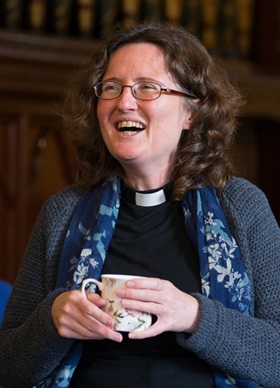
The Rev. Katy Thomas
Mothers and a few grandmothers hovered around the edges, prepared to coax or comfort. For the most part, those who come to this toddler group are not members of the church.
That is the point of this outreach ministry.
Its membership is older, but St. Mary’s prepares to be welcoming by having an activities area for children and people trained to lead them. The worst situation, Thomas pointed out, would be if young families come to try Sunday worship “and there’s nothing for them. Then they’ll go and look elsewhere.”
St. Mary’s is one of three very different churches near Manchester led by Thomas. The largest, in Wilmslow, has about 120 members and an average of 70 on a Sunday — including a “very strong” group of 15 children. The smallest is a historic building owned by the National Trust in the village of Styal, with a faithful group of teens who travel up to half an hour to get there.
Each has its own challenges, but all share a common strength, their minister said. “In every church, members of the church are so caring,” Thomas declared. “I want to put on the notice board outside, ‘Come and be loved,’ because they will be.”
Her own call to ministry came after Thomas, the daughter of a Methodist minister, spent six years abroad as a Methodist mission partner, teaching English in a Methodist school and serving as a worship leader and local preacher in Concepcion, Chile.
Being part of the ‘Connexion’
In the Methodist Church in Britain, a local church usually is part of a group of churches that form a “circuit.”
A number of circuits then form a district, of which there are 31. Districts send representatives to the Methodist Conference, which meets annually to set doctrine and policy and to elect a president and vice president to serve the following year. Another body, the Methodist Council, meets throughout the year.
British Methodism has two types of ordained ministers. Presbyters, also called ministers, preach, preside over Holy Communion and have pastoral responsibility for local congregations. Deacons, part of a religious order, have a ministry of service.
Lay leadership positions include specially trained local preachers and stewards, who help guide the life of the church or circuit. Some churches, circuits and districts also employ lay workers or youth workers
When she returned to England, the former primary school teacher became a lay worker in churches in the northeast, then decided to “candidate” in the British Methodist Church.
Now in her third post as a minister, Thomas faces the same challenges that many of her colleagues do: perpetual building maintenance issues, legal paperwork and “admin policies” that are “a huge drain on energy.” Not to mention the need to convince lay people to take on leadership roles — multiplied by the responsibility for several congregations at once.
That is normal these days, acknowledged the Rev. John Squares, a learning and development officer for the British Methodist Church who works on small-group discipleship support and discipleship strategies.
Ministers simply have too many churches and too many tasks. “Some church ministers are figuring out how to sweep up after a church meeting because there’s no one else to do it,” he said.
Thomas, with her quiet, can-do attitude, said she has learned to cope with the challenges because “the rest are all joys, because I absolutely love what I do.”
At St. Mary’s, which averages 30 to 35 worshippers on a Sunday, it’s the “early retireds who enable things to happen” under the guidance of Thomas.
Activities like the toddlers group are a way to provide steppingstones to participation in “hands-on church.” The concept, adapted from the “Messy Church” national ecumenical organization, recognizes the competing cultural opportunities drawing away families on Sunday mornings and targets the quieter late-weekend afternoons as a time of invitation.
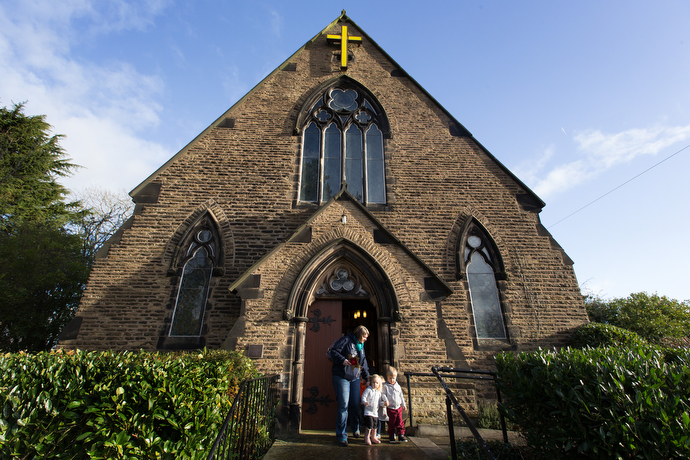
Families with young children leave St. Mary's Methodist Church in Handforth, England, after a nativity service. The church is open every Friday for quiet prayer and conversation.
Interfaith connections, with cake
As elsewhere in England, coffee, tea and cake is a hospitality requirement at Wilmslow Methodist Church.
Cake has even played a role in Wilmslow’s relationship with the mosque a mile up the road, located in an old church building.
“When the Paris bombings happened (in 2015), I just sent an email to the local leaders of the mosque, offering a hand of friendship, really, to see if there were ways in which we could introduce our congregations to one another,” recalled the Rev. Katy Thomas, minister of the Wilmslow church.
About 40 people from her three congregations visited the mosque, she said, where they had a discussion about charity, followed by a banquet.
The next time, members of the mosque came to Wilmslow church and the discussion was about hospitality. “Then we gave them a banquet of cake — the Methodist way. They loved it, honestly,” Thomas said with a smile.
“What we’re trying to do is just look at what we have in common, to build friendship, to break down the barriers of hate that are in the community, and fear.”
Last spring, after the bombing of the Ariana Grande concert at the Manchester arena, “we held a vigil in Wilmslow just for anybody who wanted to turn up, to come and light a candle and stand in solidarity together,” Thomas said. “We were able to invite members of the mosque, who were delighted to be able to come and stand with us.”
She knows that the vigil, which was set up quickly through social media and with the help of local business, drew more than 500 people, because their supply of candles ran out.
St. Mary’s hands-on program for preschoolers meets monthly from 3:30 to 5 p.m. for a theme-inspired crafts session with a snack time. “It was an opportunity for churches to do something for families at that time,” Thomas explained. “The lovely thing is families who have been connected through baptisms have come along.”
Styal, in the countryside, is the home of Quarry Bank Mill, considered one of the best-preserved textile mills of the Industrial Revolution. “It was a mill owner who discovered the Methodists were meeting in the cellar in one of the houses in the village and said, ‘I’ll let you convert this barn,’” Thomas said.
The National Trust, which runs Quarry Bank, maintains the outside of the small church building. “We pay sort of a peppercorn rent, as they would say here.”
Most of the church members do not live in the village but Thomas has initiated a heritage project, doing family tree research on a photograph of the original choir at the church. She wants to develop more information for visitors to the Quarry Mill properties so they can discover the living church there.
“When they do open (the church) on a Sunday afternoon, you can have some fascinating conversations with people,” said Thomas, who added that Methodists “from all over” have stopped by. “The opportunity at Styal is to reach out to those who are visiting.”
The Christmas season also offers a natural time to engage with businesses and the community. In early December last year, more than 100 people packed into the church on a Sunday afternoon, the minister said, before everyone set off to sing carols around the village.
More exciting than the church’s heritage to Thomas is the “lovely group” of more than 20 teenagers who arrive for Sunday school and youth fellowship. Regular film nights and an annual “away” trip together help keep them connected.
In contrast to Styal’s rural setting, Wilmslow Methodist Church, about three miles away, has a prime downtown location. Because the previous church building “had the fortune of having wood rot,” Thomas noted, the current structure is only 28 years old.
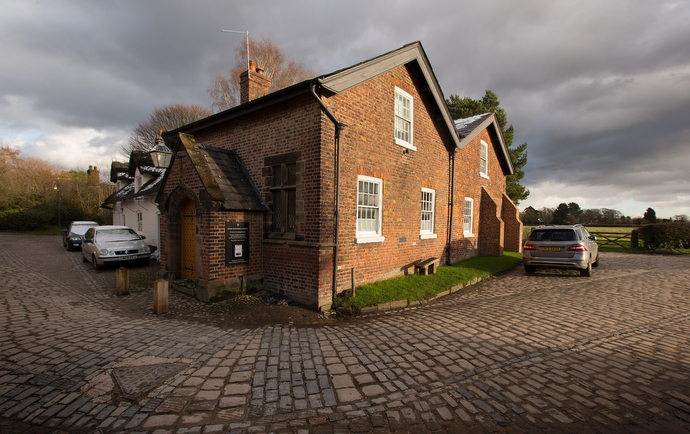
The Methodist chapel in the village of Styal was converted from a grain store in the 1830s.
The church is open seven days a week, hosting a variety of its own activities as well as those of outside groups who rent space. “One of the joys is realizing how much we are able to be in contact with the community,” she said.
Among the programs are Tiddlywinks, a church-oriented toddler time that draws families who also come for a secular nursery rhymes singalong. Tiddlywinks “has become weekly, midweek church for those families,” she explained. “There’s always a Bible story in very simplified version because they are 3 and under.”
Read more
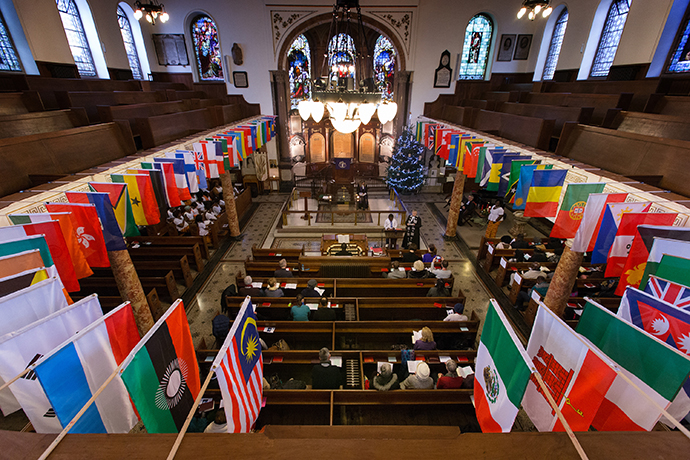 Wesley’s Chapel in London was built in 1778 by John Wesley, the founder of Methodism.
Wesley’s Chapel in London was built in 1778 by John Wesley, the founder of Methodism.
How to stay relevant in a secular society? That's the challenge for the Methodist Church in Britain as its membership dips below 200,000.
Read more stories in our series on the Methodist church in England.
A full-time preschool with employed staff, owned by the church, has been a fixture at Wilmslow for 50 years, but Thomas, who is the school’s chair, is trying to build more links with the congregation and other programs, like Tiddlywinks.
Wilmslow’s most recent project, in cooperation with other religious partners, is a dementia café. “Sadly, with the age profile of our nation, we have a growing issue of people living with different types of dementia and also a lot of social isolation,” Thomas said.
A strong Churches Together group in Wilmslow, which ranges from evangelical to Methodist to Catholic to Unitarian to United Reformed Church, worked together to get the ministry going. “Between us, we’ve got volunteers from across the churches,” she added.
The concept of a place where those with dementia issues can gather weekly has been popular enough that a second café recently was added at St. Mary’s Church.
Volunteers from the Women’s Institute — the largest voluntary women’s group in the United Kingdom — “provide us with a lot of cakes,” Thomas said.
But, more importantly, she stressed, “the opportunity to care pastorally for people who otherwise wouldn’t have any connection with church is lovely.”
Bloom is assistant news editor of United Methodist News Service and DuBose is a photographer for United Methodist Communications. Contact them at 615-742-5470 or newsdesk@umcom.org. To read more United Methodist news, subscribe to the free Daily or Weekly Digests.
Like what you're reading? Support the ministry of UM News! Your support ensures the latest denominational news, dynamic stories and informative articles will continue to connect our global community. Make a tax-deductible donation at ResourceUMC.org/GiveUMCom.

